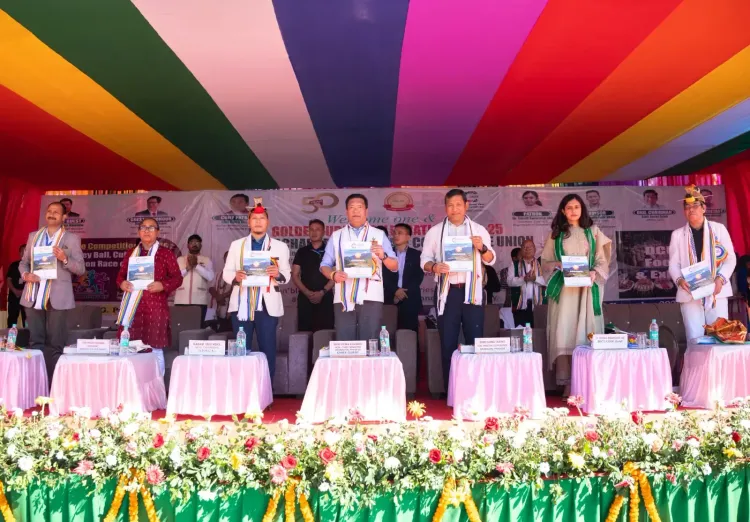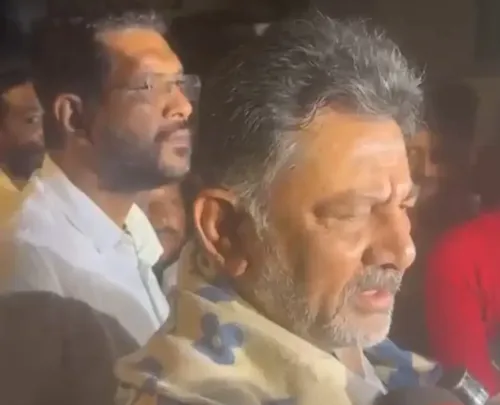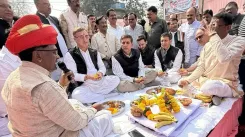What steps is Arunachal CM taking for Northeast's self-reliance in dairy, fish, and meat?

Synopsis
Key Takeaways
- High Level Task Force established for self-reliance in food production.
- Five-year plan with goals set until 2030.
- Importance of cooperative societies highlighted.
- APSCU's Golden Jubilee marks 50 years of cooperative growth.
- Collaboration with the state government for infrastructure development.
Itanagar, Nov 20 (NationPress) The Chief Minister of Arunachal Pradesh, Pema Khandu, announced on Thursday that the Union DoNER Ministry has established a High Level Task Force (HLTF) aimed at achieving self-sufficiency in the production of milk, eggs, fish, and meat throughout the Northeast region.
As the head of the HLTF, Khandu revealed that a comprehensive five-year plan is currently under development with goals set to be met by 2030. He emphasized that the participation of cooperative societies will be crucial in realizing self-reliance in these essential products.
The Development of North Eastern Region (DoNER) ministry has formed multiple High-Level Task Forces to pinpoint significant interventions and devise actionable strategies for the integrated development of the North East Economic Corridor.
This initiative followed the 72nd plenary session of the North-Eastern Council (NEC), held in November last year in Agartala and chaired by Union Home Minister Amit Shah.
The Arunachal Pradesh State Cooperative Union (APSCU) celebrated its week-long Golden Jubilee, concluding on Thursday, which commemorated half a century of the cooperative movement in the state.
During the event, Khandu reflected on the impressive journey of APSCU, which began in 1969 during the NEFA era and has now transformed into a network comprising 1,449 cooperative societies with over 220,000 members involved in agriculture, handloom, dairy, artisanal sectors, and various rural enterprises.
He recognized the essential role that cooperatives have played in improving livelihoods, particularly in remote areas where institutional support was once scarce.
Khandu expressed the Government's appreciation for the remarkable 27-district revival tour conducted by the APSCU Chairman and his team from December 2024 to April 2025, during which they engaged with more than 87,500 cooperative members and 1,500 LAMPS/PACS units.
This tour highlighted several significant issues, such as a lack of awareness regarding cooperative principles, insufficient infrastructure in 26 district unions, and the lack of cooperative banking in numerous areas. Khandu termed the Golden Jubilee as a turning point and pledged complete government support for revitalizing the cooperative movement.
He stated that the state government will collaborate closely with APSCU to implement vital reforms and enhance infrastructure. With the model code of conduct for local body elections currently in effect, Khandu refrained from disclosing any public announcements.
However, he assured that the requests outlined in a memorandum submitted by the Union would be positively addressed by the government after the elections.
Khandu stressed that reinforcing cooperatives is fundamental to achieving Atma Nirbhar Arunachal and that APSCU must develop into an autonomous and professional apex institution capable of guiding policies, ensuring transparency, empowering women and youth, and fostering sustainable rural wealth.
To accomplish this, he called for adequate training at all levels, thorough market research, and the dedication of the members.
“The upcoming years should see APSCU emerge as a robust, modern, and community-focused institution. With renewed policies and infrastructure, I am optimistic that APSCU will guide Arunachal Pradesh into a new era of cooperative-driven growth,” concluded Khandu.









